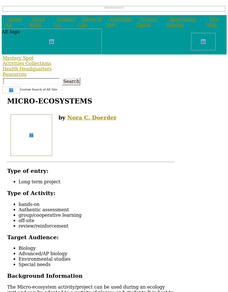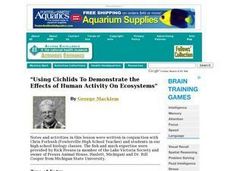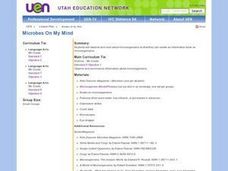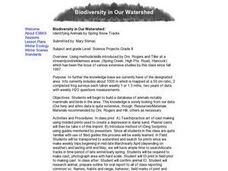Curated OER
Freshwater Habitats
Students take samples from local freshwater sources and examine them for macroinvertebrate life. They take samples from both shallow and deep freshwater environments, measure temperatures, and classify organisms found in their samples.
Curated OER
The Gaia Hypothesis: An Approach to Problem Solving in the Environment
Students are introduced to the Gaia hypothesis by examining a conceptual sketch. In groups, they analyze the way they can use Dewey's method for problem solving to solve problems within the environment. They are given a problem facing...
Curated OER
Animals Finding Rice Paddies
Fourth graders examine the animals who live in rice paddies and create a chart. In this rice lesson, 4th graders link the types of animals living in each ecosystem with a bar graph. Students use colored bars to show animals that live in...
Curated OER
Micro-Ecosystems
Students create a sustainable, self-contained ecosystem in a ten-gallon aquarium.
Curated OER
The Great Pollinators
Students discover the reproductive parts of a plant. In this biology lesson, students identify and categorize several different plants they dissect in class. Students record their information using a data chart.
Curated OER
Observation: It's A Natural!
Students play the role of naturalist in their own community just as Thoreau was in his. They observe their communities looking for positive and negative aspects on the environment. They work together in groups to complete a model for...
Curated OER
"Using Cichlids To Demonstrate the Effects of Human Activity On Ecosystems"
Students explore the freshwater ecosystem of Africa's Lake Victoria by creating a freshwater aquarium. They investigate factors affecting the aquarium's ecosystem and conduct lab activities.
Curated OER
Terraqua Column
Sixth graders create a TerrAqua column. In this ecosystems lesson, 6th graders build a TerrAqua column to conduct investigations on how living things impact the ecosystem.
Curated OER
Microbes on My Mind
Students observe and read about microorganisms so that they can create an information book on microorganisms.
Curated OER
Threatened, Endangered & Extinct Lesson Plan
Students examine the basic needs of living organisms. In this science lesson, students study ecosystems and discover that organisms have basic needs that must be met.
Curated OER
Ecosystems: What Are They and How Do They Work?
Learners explore the characteristics of major ecosystems, the interactions of the organisms within the systems, and the effects of humans on the system. Both living and non-living components are examined in this five lesson unit.
Curated OER
Spinning the Eco Web
Students examine the components and relationships of ecoregions and ecosystem management. They define ecoregion and ecosystem, list ecoregions, and participate in a simulation that demonstrates the connections between parts of the...
Curated OER
Biodiversity in Our Watershed
Eighth graders create a database of animals and birds in the area in which they live. They use molded prints to make a cast of an imprint from a specific animal. They identify and research animals and prepare an outline for an oral...
Curated OER
Making a Food Web and Learning About Ecosystems
Third graders examine the difference between a food web and food chain. They also examine the importance of the sun in a food web and food chain. Students understand what happens when you remove parts of the chain.
Curated OER
Sarita Wetland Restoration
Students collaborate on the plannng and implementation of the Sarita Wetland Restoration. The Sarita Wetland is the remnant of former Lake Sarita that was drained in the early 1900's. The goal of the entire project is to improve water...
Curated OER
Water and Rice Agriculture
Second graders investigate the agriculture of rice by reading a study guide. In this food making activity, 2nd graders read about the irrigation of rice fields used for harvesting. Students write three sentences about the rice...
Other
Adopt a Pond Wetland Curriculum Resource
The Adopt-A-Pond Program was created by the Toronto Zoo for teachers looking for a guide to wetland issues and resources.
Center for Innovation in Engineering and Science Education, Stevens Institute of Technology
Ciese Collaborative Projects: Bucket Buddies: Environmental Study
Bucket Buddies is an opportunity for students to participate in a world-wide environmental study. By identifying organisms in pond water, participating classes can compare their findings, and look for relationships in data. In addition...
BioEd Online
Bio Ed Online: Can Nutrients in Water Cause Harm?
Many different kinds of organisms live in water. Excess nutrients can cause over-abundant growth of some organisms living in water and non-point source pollution is a major threat to water supplies in the United States. In this lesson...
PBS
Pbs Teachers: Scientific American: Alien Invasion: Aquarium Capers
Evaluate the effectiveness of snails as a biological control to combat the spread of an alien alga in the Mediterranean. Grow and culture algal "mats" on microscope slides to observe the grazing behavior of pond snails.
Other popular searches
- Lake or Pond Ecology
- Pond Ecology Food Web
- Stream Pond Ecology
- Pond Ecology Texas
- Pond Ecology Grades K 3
- Pond Ecology Grades2 5
- Ecology Pond Study





















